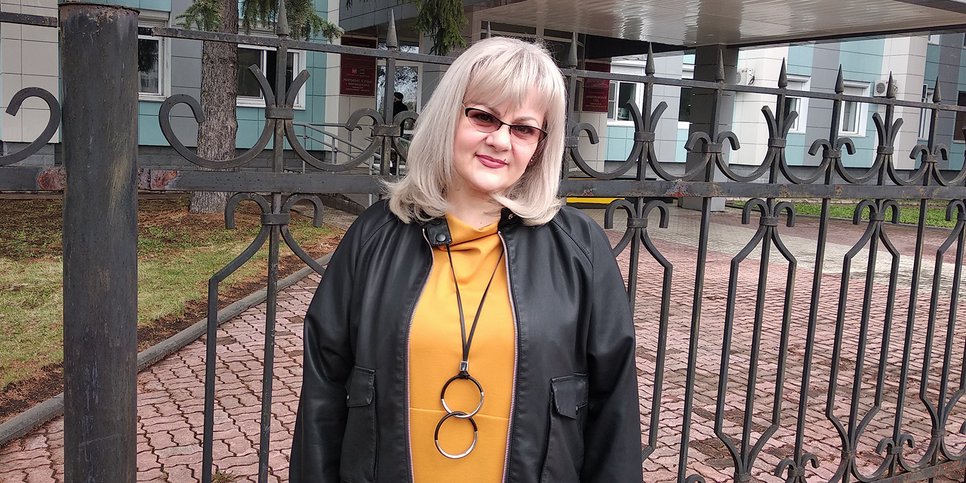Yulia Kaganovich on the day of the appeal, Birobidzhan, May 13, 2021
Yulia Kaganovich on the day of the appeal, Birobidzhan, May 13, 2021
An Appeal in Birobidzhan Toughens the Sentence Against Yuliya Kaganovich—the Believer Was Given a 2.5-Year Suspended Sentence
Jewish Autonomous AreaOn May 13, 2021, the Court of the Jewish Autonomous Region toughened the verdict handed down to Yuliya Kaganovich by the court of first instance for participating in the activities of a banned organization. Judges replaced the previously appointed monetary fine for 2.5 years of imprisonment with a suspended sentence of 1 year.
The verdict entered into force. The believer still insists on her innocence. She has the right to appeal against the verdict in cassation, as well as in international instances.
On February 16, 2021, the judge of the Birobidzhan District Court, Vladimir Mikhalev, found Yuliya Kaganovich guilty under Part 2 of Art. 282.2 of the Criminal Code of the Russian Federation. She was fined 10,000 rubles with a 5-month payment plan. The verdict was appealed against by the prosecutor Anton Vyalkov. He requested a punishment for the believer in the form of imprisonment for a term of 4 years plus 2 years of restrictions. An appeal against the verdict was also filed by the convicted woman, who, despite the mild punishment, did not agree with her conviction.
The health of 55-year-old Yuliya Kaganovich has seriously deteriorated in connection with the criminal prosecution and court proceedings. Her husband was also diagnosed with serious illnesses. In addition, the believer is caring for an elderly mother who suffered a heart attack and stroke during the criminal prosecution of her daughter.
In her last word, Yuliya Kaganovich noted: “The confession of me guilty does not correspond to either the letter or the spirit of the criminal law. I have always led a quiet and peaceful life. Even in the conclusion of the psychological and psychiatric examination it is said that I have “the most pronounced features - empathy with other people, responsiveness, kindness, sympathy with other people's successes.” With such personal qualities, it was unthinkable for me to do something extremist or something that could harm a person, society or state. "
Due to her recognizance not to leave, the woman has been restricted in her right to move freely since October 2019. The persecution of Yuliya Kaganovich began almost a year and a half after a large-scale operation codenamed "Judgment Day" with the participation of 150 security officials.
The charges are based on audio recordings of the believers' telephone conversations. However, in these records, Yuliya Kaganovich's phone number does not appear, and she is not mentioned in the conversations.
Yuliya Kaganovich, using the right guaranteed to her by the Constitution of the Russian Federation, professed her religion among her fellow believers. The authorities considered the talks about the Bible to be a threat to the security of the state and added the woman to the list of extremists and terrorists of Rosfinmonitoring.
In the Jewish Autonomous Region, 18 similar criminal cases were initiated against 23 believers. In addition to Yuliya Kaganovich, five more women were convicted, and the court of appeal has already toughened the sentences for some of them.
Russian and foreign leaders and organizations unanimously condemn the persecution of Jehovah's Witnesses in Russia. Among them is Richard Clayton, QC, British Representative to the Venice Commission. “Recognition of Jehovah's Witnesses as extremists will in no way help Russia to consolidate its reputation as a civilized country,” he notes. “This application of laws forms the image of religious freedom in Russia as extremely negative: what am I telling you. " In my opinion, this is a shocking example of how a bad law is being used for an even worse purpose. "

